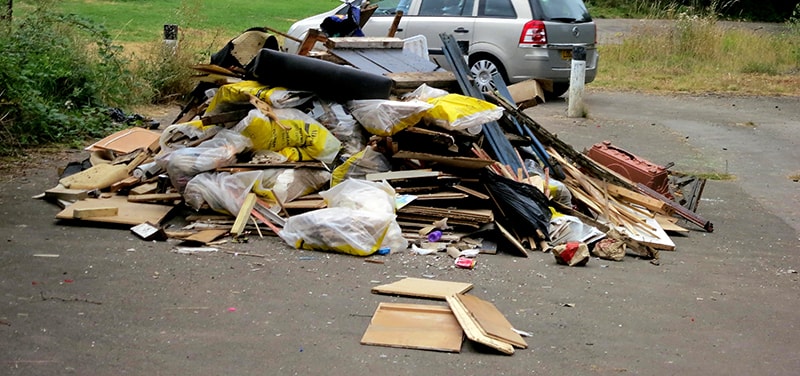Here at Junk Hunters we understand that the world of waste collection is far from glamorous, but there are a handful of important waste disposal issues that we all need to be more aware of. Fly tipping is one of these, and currently the UK has a far bigger fly tipping problem than you might think. From 2015 to 2016 the cost on local councils for clearing fly tipping waste was just under £50 million, an astonishing amount for simply clearing rubbish that wasn’t disposed of properly. And with this figure having increased on the previous 2014/2015 data, fly tipping is a problem that is getting worse. By definition, fly tipping is the deliberate dumping of rubbish in an unauthorized place, and whilst typically we think of this as being abandoned cars, most of it is everyday household waste.
Whether consciously or otherwise, we all tend to consider the offence to be a minor one which doesn’t deserve our attention. But it’s these relaxed attitudes towards fly tipping that only add fire to the problem, as it creates an environment where we accept it to be a part of everyday life. The only way to lower fly tipping rates in the UK, is if we all firstly begin to understand how serious the costs of illegally dumping waste can be.
The Extent of Fly Tipping
Statistics for the UK’s fly tipping habit don’t make for good reading.
From 2015 to 2016, local authorities dealt with 936,000 fly-tipping incidents, a 4% increase over the previous years reports.
On all these incidents, 67% involved basic household waste, a 6.5% increase on the previous year, whilst the most common place to fly-tip was once again on highways, which saw a 7.9% increase in incidents. In line with these figures, there were also small increases in the amount of fly tipping on pathways (8%) whilst there was a decrease of fly-tipping in back alleyways (6.7%).
Whereas these statistics show only a small increase, it’s still a telling sign that our fly tipping problem isn’t getting better. And it is not only in monetary terms that fly tipping takes a considerable toll either. The illegal dumping of waste, after all, can inflict considerable costs on the environment, wildlife and public health. It is for that reason, therefore, that the offence can carry some significant penalties under UK law.
Enforcement and Penalties
Both local councils and the Environment Agency (EA) have legal responsibility for fly tipping, with councils dealing with most cases of illegal waste dumping on public land and the EA investigating and enforcing larger scale and more serious offences.
The smaller, individual cases can now be dealt with on the spot by the issuing of fixed penalty notices (FPN), set anywhere between £150 and £400. More serious fly tipping offences, and especially those committed on a larger scale, can see the offender prosecuted in either the Magistrates or the Crown Court. If found guilty in Magistrates Court the offender is liable for a prison sentence of up to a maximum of 12 months and/or a fine on which no upper limit is fixed. In Crown Court, meanwhile, a fly tipping prosecution can lead to a prison term of up to five years and/or a similarly unlimited level of fine.
We hope that this gives you some idea of how serious the problem is, and if we all make sure to dispose of our waste properly we believe here at Junk Hunters that we can bin our nations fly-tipping habits.



